Ramon Torres ’08 has explored a variety of careers since graduating from Claremont McKenna College.
He started out as an engineer, tried out investment banking, pivoted to acting and movie production, climbed the ladder at several major entertainment companies, and activated his commitment to equity and inclusion in the workplace.
And he’s not done yet. CMC prepared Torres to handle all those transitions with grace and agility. In an interview, Torres reflects on his time at CMC.
What were some of your favorite experiences while at CMC?
A few memories include: Long boarding from class-to-class, getting to know everyone on campus, taking full advantage of the consortium of colleges (i.e., dining halls and parties), and meeting Henry Kravis ’67 on the Financial Economics Institute (FEI) trip.
I recently recalled a previously forgotten experience at a sponsored CMC Leadership Camp for high school students (it might have been for extra credit). In an exercise, students were divided into small groups, and one student was given crucial information that would help the group solve a puzzle. Eventually a pattern emerged—the loudest, most gregarious students would take charge and exclude other perspectives, thus failing to find the crucial information required to solve the puzzle. The bigger picture of how this related to leadership was not clear to me at the time. It wasn't until much later that I noticed a senior leader, whom I respect and admire, always made it a point to ask everyone in the room for their perspective. Fast forward to today, I have spent hours looking for the notes from that camp—I can only imagine what other nuggets of wisdom those high school students received that Fortune 500 leaders already know.
How would you describe the CMC community?
It was the perfect mix of liberal arts with rational preparation for professional careers.
How did your time at CMC prepare you for your career?
If you had told me that my post-CMC career would span working 100-hour weeks as an investment banker, acting/producing/distributing an indie Netflix film, supporting the first GM of a streaming service that would end up as HBO Max, staffing the offices of the COO of AT&T, two WarnerMedia (now Warner Bros. Discovery) CEOs, I would have ordered whatever you were having. In hindsight, CMC was preparation for this future experience—equally varied, and intellectually challenging. It was a place where I delved into different perspectives and topics whether it be Porter's Five Forces with Professor Janet Smith, or Ralph Ellison's Juneteenth.
Why is it important for you to be involved at CMC and give back?
There are many reasons why giving back is important, but I'll highlight two.
The first is that careers can be non-linear and that's okay. For example, I remember feeling pressure to find an internship in either finance, consulting, or government; and, if not, that represented failure. I want to help students find the path appropriate for them regardless of any social pressure. Secondly, building others up is fulfilling in its own right. In my own quest to find an internship, one particular alumnus call left me feeling dejected (see point 1). My trusted hallmate tactfully reframed my experience into a teachable moment—she said something to the effect of, “remember how you feel now so that when you're on the other side, you know what not to do.”
Is there anything else you would like to add?
I recently joined the board of NYC's premier LGBTQ+ film festival, NewFest, and I'm looking for advice on general board governance.

